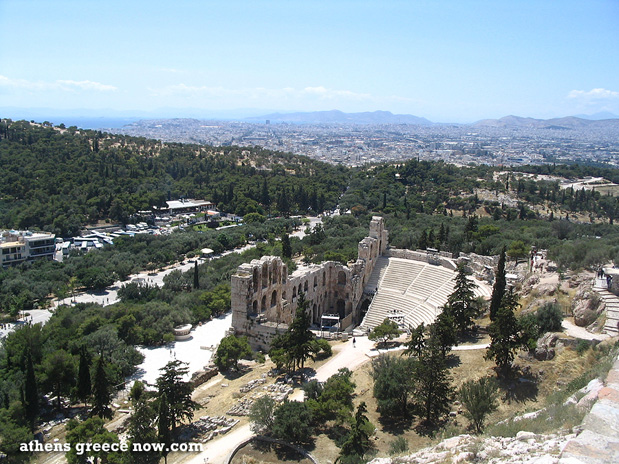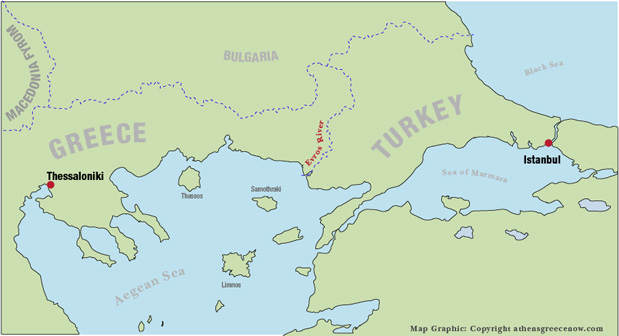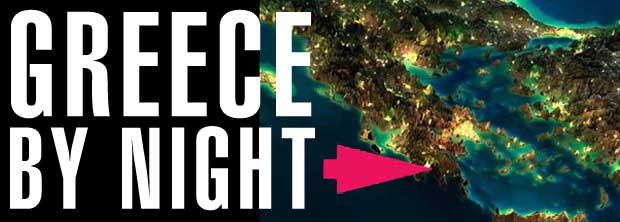NEWS ARCHIVE - JANUARY 2011
For current news items, go to the home page
January 18, 2011
Lawlessness and the road to bankruptcy
On the subject of defying the economic order, Alexis Papachelas at Kathimerini on "Dealing with Lawlessness:"
"...In the case of tollbooth jumping, for example, there are groups of citizens who are right to protest additional tolls without secondary roads and without signs of progress in the construction and maintenance of the national highway network. But if they take their protests too far and too many others join in without real cause, Greece will find itself in a position where it will no longer be able to borrow for large-scale infrastructure projects. And, whether we like it or not, state money simply won’t exist anymore. If we adopt the stance of the left-wing parties, who urge citizens not to pay their telephone and electricity bills, to drive through tollbooths and to skip bank loan payments, the road to bankruptcy will become steep and short. "
What follows bankruptcy would be a handful of options, mostly unpleasant if not potentially bloody. The outside view of the Greek conundrum is that the Hellenic society simply refuses to pay for what it uses, or is so paralyzed by internal debate it cannot muster the strength to face the accumulated obligation. Through the mechanism of debt deferment, Greek governments have created such a massive amount of public spending there's hardly any way out from under it except by slashing public services and payrolls, and then also increasing the cost on everything else to bring in more revenue.
But on the inside of Greece is a debate on whether the situation can be handled by other means: going back to the drachma (which is the least favorite option, almost guaranteeing a slide back toward third world economics); or by a massive taxation of private wealth (a point already long noted since the crisis began, hence the capitol that's left for non-Greek banks); and finally through a revolutionary reordering of society along whichever political entity can grab enough power. All of these solutions seemed to be determined to thumb a nose at the IMF/eurozone bailout structure which would collapse immediately, effectively sealing Greece off from outside financial help for an unknown period of time.
Many countries have successfully negotiated their way through sovereign debt default (Brazil) or have failed at it so badly (Argentina) they remain in a financial quarantine for the for seeable future. How many more options could Greece have?

View of The outdoor theatre Odeon of Herodes at the Parthenon, the Acropolis, Athens Greece View Enlargement
January 13, 2011
Greek Unemployment Hits 13.5%
The Financial Times carries the story by Dimitris Kontogiannis reporting on the historic high of recorded unemployment in Greece, and for the percentage of unemployed to rise further toward a peak 15% rate expected in 2012:
"In a sign that the recession in Greece is taking its toll, unemployment surged to a multi-year high in October and is forecast to go higher this year, raising fears that it could fuel social tensions.
More than 56.000 people joined the ranks of the unemployed in October compared to a month earlier, an increase of about 193,000 on October 2009. This took the unemployment rate to 13.5 per cent, from 12.6 per cent in September, according to the Hellenic Statistics Authority.
...The 12.2 per cent average unemployment rate forecast for 2010 is expected to rise to 14.3 per cent in 2011, before peaking at 15 per cent in 2012, according to the updated memorandum agreed to with the EC, the ECB and the IMF.
The economy is expected to contract by 3 per cent in 2011 for an unprecedented third year in a row from an estimated 4.2 per cent in 2010. "
The Financial Times article covers a lot more ground, speculating on what parts of the unemployment figures reflect actual job losses and what part is the result of restructuring to eliminate duplication and various inefficiencies in the Greek Public Sector.
Greece planning to leave bond market alone in 2011
Wall Street Journal has the story that senior Greek officials are saying that the high interest on bond sales means Greece will shy away from any further attempt to put government bonds on the market:
"Facing prohibitively high borrowing costs, Greece is highly unlikely to tap the bond market this year, two senior government officials said Thursday, unless the European Union takes convincing steps to stem the debt crisis engulfing the euro zone.
...Earlier this month, the spread between 10-year Greek government bonds and their benchmark German counterparts--a measure of credit risk--reached a record high, with the yield on the 10-year Greek bond rising to 12.55%, compared with 2.82% for the 10-year bund.
...Earlier this week, Finance Minister George Papaconstantinou blamed the ongoing turbulence in European bond markets for Greece's still-high spreads, saying they reflected broader unease about the euro zone as a whole rather than just Greece.
Speaking in an interview, he said that "a major decision that will once and for all settle the issue of the sustainability of debt in the euro zone" would be reached by European leaders in the next two months. "
Greek Public Transportation System facing major overhaul
Kathimerini reports on the new plans being made in the Papandreou government for changing the money-draining public transportation system in Greece:
"Hundreds of employees are to be transferred, ticket prices will be increased and strict spending guidelines will be introduced, according to a plan for the overhaul of the public transport system approved by the Cabinet yesterday.
Urban transportation companies in Athens, which are all publicly owned, lose a total of about 600 million euros a year and are seen as a huge drain on state funds at a time when the government is trying to slash the budget deficit."
Greece and Israel joining forces for "disaster force"
The Jewish news Agency JTA reports that Greek and Israeli officials are creating an anti-disaster response plan to deal with natural and man-made disasters:
"...Greece said it would organize the regional force and has invited the Palestinian Authority and other countries in the region such as Turkey, Egypt and Jordan to join the effort, the Israeli daily Haaretz reported. The force comes on the heels of the Carmel Forest fire in northern Israel last December; Greece was among the countries to assist in quelling the blaze.
...[Greece/Israel] reportedly also discussed the Exclusive Economic Zone with Cyprus and how Greece can participate in the Leviathan natural gas reserve."
The Leviathan discovery is considered one of the largest natural gas beds ever found, and could be worth upwards of $5 billion USD a year.
Credit Ratings Redux: USA facing possible downgrade
Wall Street Journal reports on the tough spot the United States Federal Government finances will be facing soon:
"Moody’s said the U.S., Germany, France and the U.K. still have debt metrics, including the debt affordability, compatible with their triple-A ratings at Moody’s. But all four countries must bring the future costs arising from pension and healthcare subsidies under control if they “are to maintain long-term stability in their debt burden credit metrics,” Moody’s said in its regular triple-A Sovereign Monitor report.
Moody’s noted that measures were recommended by the U.S. National Commission on Fiscal Responsibility and Reform, appointed by President Obama, to achieve a balanced primary budget by 2015, but that there was insufficient support to trigger consideration of those recommendations by the full Congress."
Unlike Greece within the EU, there's no federation of countries large enough to bail-out the United States, and the repercussions for the world financial system (which is doing everything it can to keep itself intact and unaltered) could be devastating.
January 10, 2011
Bad News: Greek Bond Yield Sets New Record
Canadian Business Online reports (via the AP) on the surge in costs for debt Greece is facing on latest bond sale:
"Greek bond yields hit another record high Monday amid a broader flare-up in Europe's debt crisis and despite better than expected deficit reduction figures.
The 10-year bond yield exceeded the equivalent German yield by 10 percentage points for the first time, only a day before a $1.96 billion auction of six-month treasury bills — considered an important test of market sentiment.
Greece has launched a major effort to cut borrowing costs in exchange for bailout loans worth €110 billion from the IMF and other countries using the euro. The government says it wants to return to long-term bond markets sometime this year.
But the interest gap, or spread, on 10-year bonds compared with the German issue reached a worrying 1,001.1 basis points amid renewed worries about some EU nations' fight to handle heavy debt loads."
Qualified Good News: Greece’s 2010 Deficit Shrinks 36.5%
A report at Bloomberg by Marcus Bensasson on Greece exceeding the target for spending reductions for the 2010 year:
" Greece’s central budget deficit contracted more than expected in 2010 as spending cuts made up for a shortfall in revenue growth, according to preliminary data released by the Finance Ministry.
The gap, which doesn’t include spending by state-owned institutions and companies, shrank 36.5 percent to 19.6 billion euros ($25.3 billion) from 30.8 billion euros in 2009, the ministry said in an e-mailed statement today from Athens. The contraction beat a goal to cut the deficit by 33.2 percent, the ministry said. "
"Euro is Dead"
People are still using the currency everyday. of course (China, for example has $2.65 trillion - $3.4 trillion USD - of foreign exchange reserves in the euro), but Washington Post Foreign Policy has an article in which Charles Calomiris claims "The Euro is Dead," and then recommends how it could survive 'when certain member states (Greece, Ireland, Portugal) are forced to exit':
"European leaders tell us that this is impossible. There is no legal mechanism, they say, for exiting the euro. But the collapse of the euro is simple arithmetic: Once a country's debt-to-GDP ratio gets high enough, it becomes impossible for it to generate enough future taxes to repay its existing debt and interest costs...
The only way out of this conundrum is for countries with insurmountable debt burdens to default on their euro-denominated debts....
... Greece is at the top of that list. The country will soon have a sovereign debt-to GDP ratio of more than 150 percent and an economy that contracted approximately 4 percent in the past year. It has long suffered from the worst corruption and largest shadow economy in Europe, while also possessing some of the lowest labor participation rates, most generous pension systems, and highest consumption rates among its European peers.. "
Related: Interview at Kathimerini with EU Commissioner Olli Rehn who discusses the relationship between Greece and the EU while the restructuring is occurring, and how it started "You were living beyond your means."
Educated Young Greeks leaving
The blog Living in Greece had a link to this article at the Qatar Peninsular about educated young people of Greece (and other mediterranean countries) searching abroad for jobs as their home countries continue to economically contract.
"In Spain, Portugal, Italy and Greece, the overeducated but underemployed young are a worrying new demographic. Many live with their parents, unable to afford their own accommodation. Their dilemma is whether to stay in the bosom of their family, with the risk of a miserable future, or strike out in search of a better life elsewhere.
...Experts warn that the brain drain could have disastrous consequences: intelligent young professionals are what countries will need to emerge from the crisis with bright prospects."
For current news items, go to the home page
January 4, 2011
Wall to block illegal immigrants going up on Greece/Turkey Border
UK Daily Mail on the wall being put up to stop illegal immigration from the Turkey side of the border:
"The Greek government has unveiled plans to construct a wall along its 128-mile land border with Turkey in order to tackle the influx of illegal immigrants.
Interior minister Christian Papoutsis said the wall was a necessary measure after more than 100,000 people illegally entered the Mediterranean nation last year.
But the plans - which have compared with the 650-mile barrier along sections of the border between the U.S. and Mexico - have been criticised by the European Commission as a 'short-term measure' that does not deal with the root of the problem."
Kathimerini on the fence:
" In a statement on his website, Papoutsis yesterday clarified that the fence he is proposing would be erected along the 12.5-kilometer section of Greece’s land border with Turkey that does not run along the Evros River. Papoutsis insisted that the government is “extremely sensitive to the human rights of migrants.” But he added that the government’s “ultimate duty is to protect the rights of Greek citizens and those living legally in Greece.”
Sources at the ministry yesterday heralded the immediate launch of feasibility studies for the fence which is to be made of reinforced barbed wire set in a concrete base."
CNN Online news also has more about the reactions in Europe about the prospect of a fence going up that might stop legitimate asylum seekers.

Closed Greek professional trades to be opened
Kathimerini story on opening up Greek professions:
"A law to open up dozens of closed professions will be passed through Parliament by the end of this months, according to plans agreed on yesterday by Prime Minister George Papandreou and members of his Cabinet.
...Papandreou emphasized to his ministers that in the current climate, when pensions are being cut and jobs are being lost, some professions cannot justify maintaining unrealistic privileges and barriers to entry that have the end result of pushing up prices for consumers.
Greece, as well as the EU and the IMF, hope that the opening up of more than 100 closed professions will bring prices down, make the economy more competitive and stimulate growth."
On the short list of demands from the IMF/eurozone (particularly the European Central banks) is the end of Greek union domination over so many key professions in Greece. Greek unions are of course fighting this every inch of the way, as lucrative and protected industries are being forced into competition and the inevitable price adjustments that would follow. The benefit for average Greeks is the reduction in costs for many services and goods, and a (theoretical) improvement in choices for consumers.
For more overview on this, see the Wall Street Journal interview with European Central Bank board member Jurgen Stark from December 2010.
Turkey negotiating return of Greek, Christian and Jewish properties
The Athens News on the labors of the Turkish government under pressure for EU candidacy:
"Turkey for decades has ignored demands of the Patriarchate due to mistrust stemming from rivalry with Greece. But deputy Prime Minister Bulent Arinc's visit coincided with government promises to consider reopening a seminary that trained generations of Ecumenical Patriarchs and returning properties confiscated by the state to Christian and Jewish minority foundations.
Turkey, a predominantly Muslim country, is striving to join the European Union, but faces criticism that it discriminates against non-Muslim citizens and Alevis, a Muslim minority sect. "
Some over view of the dilemma facing Turkey about past actions against Greek, Jewish and other minority groups, see wikipedia. Also see the Hagia Sophia subject for an even broader view.
December 31, 2010
Bomb blasts in Ambelokipi, and Athens night club
Kathimerini on the bombing which took place at an Athens area court building:
"The bomb exploded at 8.20 a.m. after anonymous warnings were telephoned in to the private television channel Alter and the Eleftherotypia daily. In each case, the caller said that a bomb strapped to a motorcycle would explode outside the Athens Court of First Instance in 40 minutes and gave details of the bike’s registration number. The media organizations briefed the police, who evacuated the court building and cordoned off the area.
The blast damaged at least 10 parked cars and the facade of the court building as well as blowing the windows out of nearby apartment blocks.
...Visiting the scene of the blast, Justice Minister Haris Kastanidis said authorities “would not be intimidated by terrorist acts.” Government spokes-man Giorgos Petalotis stated that authorities “strongly condemn any action that, without moral or popular legitimacy, attempts to undermine our democracy and terrorize its citizens."
The bombing follows a recent series of letter bomb attacks against foreign embassy's in Athens, and also a molotov firebombing at the Greek Embassy in Buenos Aires which took place within hours of the Ambelokipi attack.
Bombing at Athens night club
The Australia Herald Sun on the bombing trend in Athens ahead of terrorist trials for anarchists:
"There is a dangerous under-current as there are various groups in Europe who are opposed to democracy and who express solidarity when their respective members are jailed," said political scientist Mairi Bossi.
Police in Greece insist there is no solid evidence showing actual cooperation between the Greek and Italian groups, though the issue has been raised during joint European police meetings.
..."We see a mobilisation by extremist groups in view of this trial," police spokesman Thanassis Kokkalakis said. Over a dozen suspects will be tried on January 17 for alleged involvement in Conspiracy of Fire Nuclei, a radical anarchist group that in November sent 14 parcel bombs to embassies in Athens and European government leaders.
Last week, a similar bombing campaign in Rome injured two people at the embassies of Switzerland and Chile and also targeted the Greek embassy."
Public sector government staffing to shrink by a third
An unprecedented staffing reduction is due to take place throughout the Greek public sector. Story at Kathimerini:
" The civil service will be reduced by about a third over the months to come, according to the government’s plans for streamlining the public sector as part of its efforts to cut spending, sources told Sunday’s Kathimerini.
The government has already conducted a census of civil servants and Interior Minister Yiannis Ragousis has asked each department to evaluate its personnel but the merger of various bodies and the transfer of staff is expected to have an immediate impact on the size of the public sector. Ultimately, staff numbers will drop by 30 percent, the government believes."
Greek majority against leaving euro
A series of public opinion polls conducted by the Kapa Research Firm had results published at the Athens News:
"...58.2 percent of respondents agreed with the statement that Greece has avoided bankruptcy, with 33.5 percent opting for the opposite opinion. Finally, 60.3 percent of respondents are against Greece's exit from the EU and 61 percent are against a possible return to the drachma. "
[Note, simultaneous with the closing down of the Athens Plus publishing venture, the perennial English-language newspaper Athens News has recently overhauled its web site introducing a much better-looking, and easier to use interface.]



Greece's Golden Visa program
